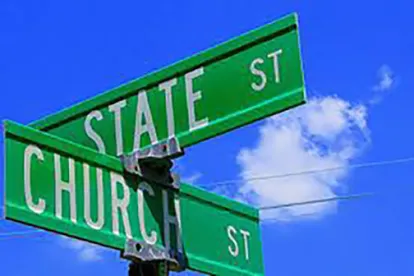In a 7-2 ruling handed down last week, the U.S. Supreme Court held that parochial school teachers do not, by-and-large, enjoy the protections of federal employment discrimination laws such as Title VII, the Age Discrimination in Employment Act (ADEA) and the Americans with Disabilities Act (ADA). The Supreme Court’s ruling both clarifies and expands the boundaries of the so-called “ministerial exception” to employment discrimination laws.
In the U.S., religious organizations are not automatically exempt from laws of general applicability, even with respect to employment laws. For example, prior Supreme Court cases have held that they must comply with child labor and minimum wage laws.
At the same time, the First Amendment to the U.S. Constitution ensures that the government cannot violate the “free exercise” of religion. As a result, when evaluating whether a law of general applicability can be applied to religious organizations, courts must determine whether and to what extent the law in question will interfere with the organization’s ability to make decisions which are “essential to the institution’s central mission.”
The “ministerial exception” was first recognized by the U.S. Supreme Court in 2012, when it held that the First Amendment did not allow a religious school teacher who had been terminated to bring an ADA suit against her employer, an Evangelical Lutheran school. In that case, the employer argued that it had terminated the individual in part due to her violation of church doctrine, and that allowing the employee to move forward with her ADA suit would interfere with the church’s internal decision-making with respect to its faith and mission. The Supreme Court agreed, relying on evidence that the individual had received significant religious training and was considered to be a “Minister of Religion” within the organization, with the expectation that she would convey the church’s message and carry out its mission.
In its 2020 term, the Supreme Court agreed to hear Our Lady of Guadalupe School v. Morrissey-Berru, the consolidation of two cases involving Catholic elementary school teachers in the Archdiocese of Los Angeles. As in the 2012 case, the circumstances involved teachers being terminated and subsequently suing their religious school employer for violations of federal employment law.
What differed in these 2020 cases was the extent to which the teachers in question were “ministers” of the church. Whereas the teacher in the 2012 case had extensive religious training and was given the title of “minister,” the Catholic school teachers in Los Angeles were not. They were “lay” teachers, and did not hold specifically religious education credentials. One of the teachers further argued that she was not even a “practicing” Catholic during the time she was employed by the Archdiocese of Los Angeles.
The Supreme Court’s majority was unconvinced that those distinctions mattered for purposes of the ministerial exemption. The majority opinion, written by Justice Alito, stressed that the question of whether or not an individual is given the title of “minister” is not the be-all, end-all of the analysis: “[s]imply giving an employee the title of ‘minister’ is not enough to justify the [ministerial] exception. And by the same token, since many religious traditions do not use the title ‘minister,’ it cannot be a necessary requirement.”
According to Justice Alito, when a religious school teacher holds the title of minister, the analysis is a “relatively easy one.” In all other cases, what ultimately matters is what an employee actually does in their job duties. Both teachers in these cases were their students’ primary teacher of religion: they taught religious curriculum (including prayers); prayed with their students; and accompanied them to Mass. Whether or not the teachers had themselves received “sufficient” religious training is inconsequential: the schools determined that both teachers were sufficiently familiar with Catholicism to undertake their duties, and “judges have no warrant to second-guess that judgment.”
While the Supreme Court’s decisions on the “ministerial exception” have all involved school teachers, it is clear in the Supreme Court’s decision that the exception could apply to others who are employed by religious organizations and whose duties are “vital” to the church’s mission. For example, the ruling may apply to those involved in community outreach and charity work. Indeed, the dissenting opinion, written by Justice Sonia Sotomayor, warns that the Supreme Court’s decision might have “grave consequences,” expanding the ministerial exception to “countless coaches, camp counselors, nurses, social-service workers, in-house lawyers, media-relations personnel, and many others who work for religious institutions.”
In light of the Our Lady of Guadalupe School v. Morrissey-Berru decision, religious organizations may feel emboldened to put forward the ministerial exception as a defense to employment discrimination claims. Only time will tell as to how far beyond the traditional teacher cases the exception will apply, and whether Justice Sotomayor’s warning will prove to be prescient, alarmist or somewhere in-between.


 />i
/>i

